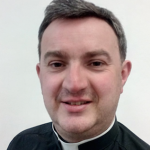
 Selina Stone directs CTC’s William Seymour Programme – increasing the engagement of Pentecostal churches in community organising. Here she and CTC Director Angus Ritchie blog about their recent seminar on Pentecostalism, Power and Community Organising.
Selina Stone directs CTC’s William Seymour Programme – increasing the engagement of Pentecostal churches in community organising. Here she and CTC Director Angus Ritchie blog about their recent seminar on Pentecostalism, Power and Community Organising.
Last Tuesday,we visited the University of Roehampton at the invitation of Dr Andrew Rogers to present a paper to his postgraduate Research Group in Ministerial Theology. It was an exciting opportunity to engage with a group involved in both reflection and action on the issues we were exploring.
Angus began by explaining the key characteristics of Saul Alinsky’s model of community organising, which continue to characterise the work of IAF and Citizens UK:
1. A relentless focus on relationships: In the ‘one-to-one’ meeting, the organiser or grassroots leader builds relationships, identifies other leaders and also the issues people have the appetite to act on.
2. A powerful, long-term alliance: Instead of mobilising people to campaign together on single issues, Alinsky used the individual issues to build long-term strategic alliances of local grassroots institutions.
3. Financial independence: The costs of running these alliances, including the pay of salaried organisers, was raised as much as possible from dues paid by the membership (‘hard money’) topped up by grants from charitable foundations (‘soft money) but never from government.
4. Teaching through experience and action: Action was not only engaged in to win on the specific issue, but to develop grassroots leaders, to encourage the participation of the most excluded and to build relationships of solidarity and trust.
5. Tension: Dramatic tactics were used to apply moral or practical pressure to the ‘target’ of an action, but always through legal and peaceful means.
6. Avoiding the “wedge issues”: People in the poorest neighbourhoods were often divided by certain issues but action was only taken on issues where there was a common interest and desire.
7. Assemblies: Regular assemblies would bring thousands of members together, to hold the ‘targets’ of an action to account.
Angus stressed the importance of rooting the work of organising in the beliefs and values of the different institutions that engage in the work – and the distinctive work of CTC in reflecting theologically on organising, for the Christian church in general and for different denominations and traditions.
Selina continued by explaining a few crucial considerations for engaging Pentecostals in community organising.
1. The Power of the Holy Spirit: Pentecostals recognise the Holy Spirit as a catalyst for deep inner transformation. Drawing on the work of Wolfgang Vondey, Selina contrasted two Pentecostal understandings of the way the Spirit forms disciples – social activism (which identifies Christian formation as ‘participation and leadership in the struggle against poverty, deprivation, and oppression’ and social passivism (which ‘withdraws into a sectarian mindset of individualism, self-improvement, and triumphalism’)
Selina drew out the capacity of community organising to help Pentecostal churches to work with the Spirit to form disciples through and for the struggle for justice – recognizing the dignity and agency of those who experience injustice and oppression and “not doing for them, what they can do for themselves”.
2. Sin, salvation and the sacred: Due to its roots in the Holiness tradition, Pentecostalism emphasises the personal nature of sin, salvation and righteousness. Selina’s presentation drew on the work of Amos Yong to explore the social and political elements of these concepts: ‘The goal (of a pentecostal political theology) is to develop holistic soteriologies focused on saving the “whole person”, on linking conversion to community building, and on not dichotomising spiritual from social transformation.” As Selina explained, the experience of Pentecostals engaged in organising has an important contribution to make to the development of such soteriologies – and this is the subject of her own doctoral research.
3. Leadership: The development of leaders is a key area in which the priorities of Pentecostal churches align with those of community organising. Citing Paolo Friere, Selina explained the approach organising takes to leadership formation. Friere places dialogue at the centre of his approach, arguing teachers need to ‘…go to the people…in order to come to know through dialogue with them both their objective situation and awareness of that situation…One cannot expect positive results from a…political action program which fails to respect the particular view of the world held by the people.’
The themes explored in this seminar form the basis for CTC’s forthcoming report on Pentecostalism and organising. If you would like to be involved further in this conversation, or find out more about the William Seymour Programme, contact Selina on selinas [AT] theology-centre.org

Leave a Comment